Single Page Mode
Chapter 1
Observing the Armies on the Battlefield of Kuruksetra
धृतराष्ट्र उवाच
धर्मक्षेत्रे कुरुक्षेत्रे समवेता युयुत्सवः
मामकाः पाण्डवाश्चैव किमकुर्वत सञ्जय
dhṛtarāṣṭra uvāca
dharma-kṣetre kuru-kṣetre
samavetā yuyutsavaḥ
māmakāḥ pāṇḍavāś caiva
kim akurvata sañjaya
SYNONYMS
TRANSLATION
Dhṛtarāṣṭra said: O Sañjaya, after assembling in the place of pilgrimage at Kurukṣetra, what did my sons and the sons of Pāṇḍu do, being desirous to fight?
PURPORT
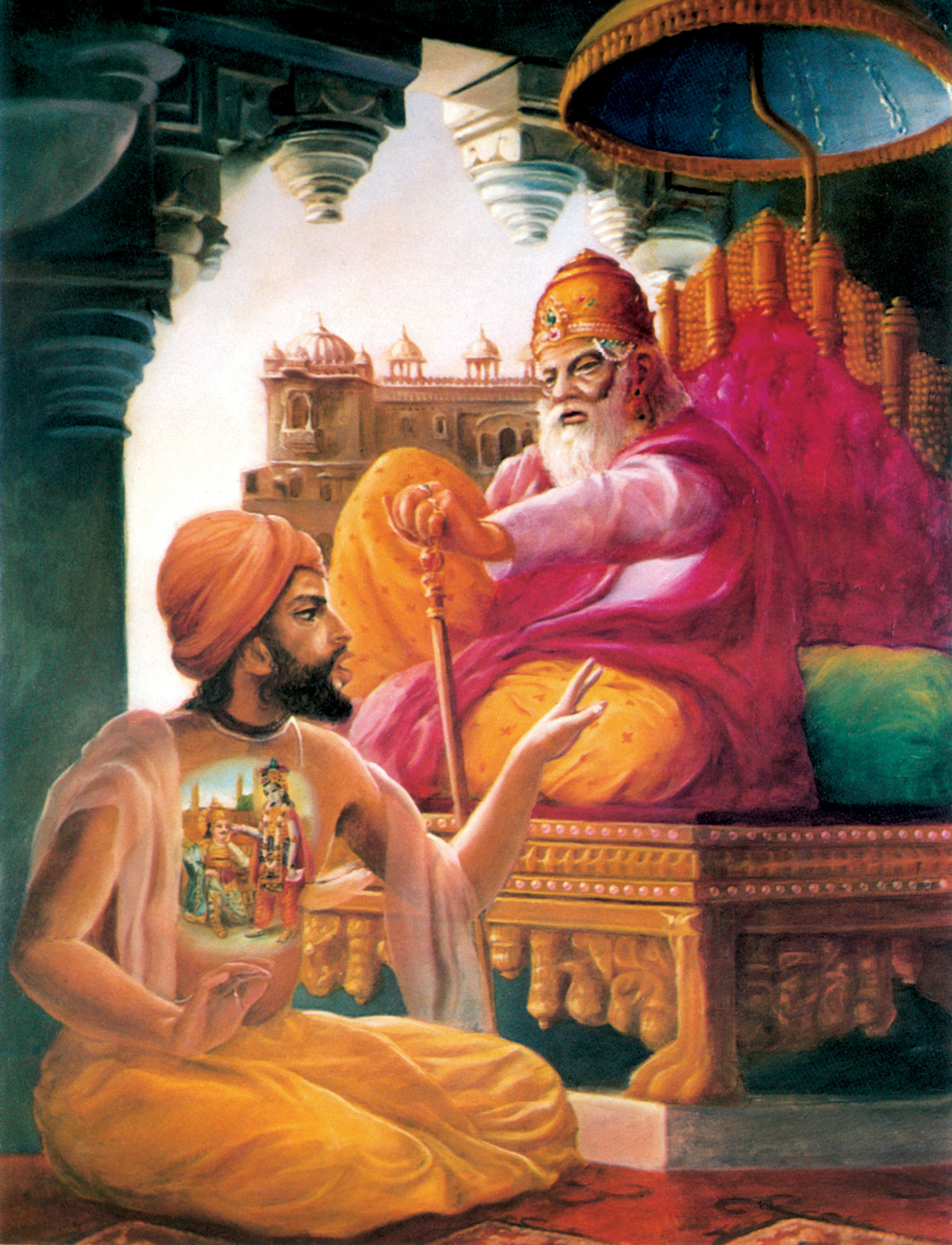
The topics discussed by Dhṛtarāṣṭra and Sañjaya, as described in the Mahābhārata, form the basic principle for this great philosophy. It is understood that this philosophy evolved on the Battlefield of Kurukṣetra, which is a sacred place of pilgrimage from the immemorial time of the Vedic age. It was spoken by the Lord when He was present personally on this planet for the guidance of mankind.
The word dharma-kṣetra (a place where religious rituals are performed) is significant because, on the Battlefield of Kurukṣetra, the Supreme Personality of Godhead was present on the side of Arjuna. Dhṛtarāṣṭra, the father of the Kurus, was highly doubtful about the possibility of his sons’ ultimate victory. In his doubt, he inquired from his secretary Sañjaya, “What did my sons and the sons of Pāṇḍu do?” He was confident that both his sons and the sons of his younger brother Pāṇḍu were assembled in that Field of Kurukṣetra for a determined engagement of the war. Still, his inquiry is significant. He did not want a compromise between the cousins and brothers, and he wanted to be sure of the fate of his sons on the battlefield. Because the battle was arranged to be fought at Kurukṣetra, which is mentioned elsewhere in the Vedas as a place of worship-even for the denizens of heaven-Dhṛtarāṣṭra became very fearful about the influence of the holy place on the outcome of the battle. He knew very well that this would influence Arjuna and the sons of Pāṇḍu favorably, because by nature they were all virtuous. Sañjaya was a student of Vyāsa, and therefore, by the mercy of Vyāsa, Sañjaya was able to envision the Battlefield of Kurukṣetra even while he was in the room of Dhṛtarāṣṭra. And so, Dhṛtarāṣṭra asked him about the situation on the battlefield.
Both the Pāṇḍavas and the sons of Dhṛtarāṣṭra belong to the same family, but Dhṛtarāṣṭra’s mind is disclosed herein. He deliberately claimed only his sons as Kurus, and he separated the sons of Pāṇḍu from the family heritage. One can thus understand the specific position of Dhṛtarāṣṭra in his relationship with his nephews, the sons of Pāṇḍu. As in the paddy field the unnecessary plants are taken out, so it is expected from the very beginning of these topics that in the religious field of Kurukṣetra where the father of religion, Śrī Kṛṣṇa, was present, the unwanted plants like Dhṛtarāṣṭra’s son Duryodhana and others would be wiped out and the thoroughly religious persons, headed by Yudhiṣṭhira, would be established by the Lord. This is the significance of the words dharma-kṣetre and kuru-kṣetre, apart from their historical and Vedic importance.
सञ्जय उवाच
दृष्ट्वा तु पाण्डवानीकं व्यूढं दुर्योधनस्तदा
आचार्यमुपसङ्गम्य राजा वचनमब्रवीत्
sañjaya uvāca
dṛṣṭvā tu pāṇḍavānīkaṃ
vyūḍhaṃ duryodhanas tadā
ācāryam upasaṅgamya
rājā vacanam abravīt
SYNONYMS
TRANSLATION
Sañjaya said: O King, after looking over the army gathered by the sons of Pāṇḍu, King Duryodhana went to his teacher and began to speak the following words:
PURPORT
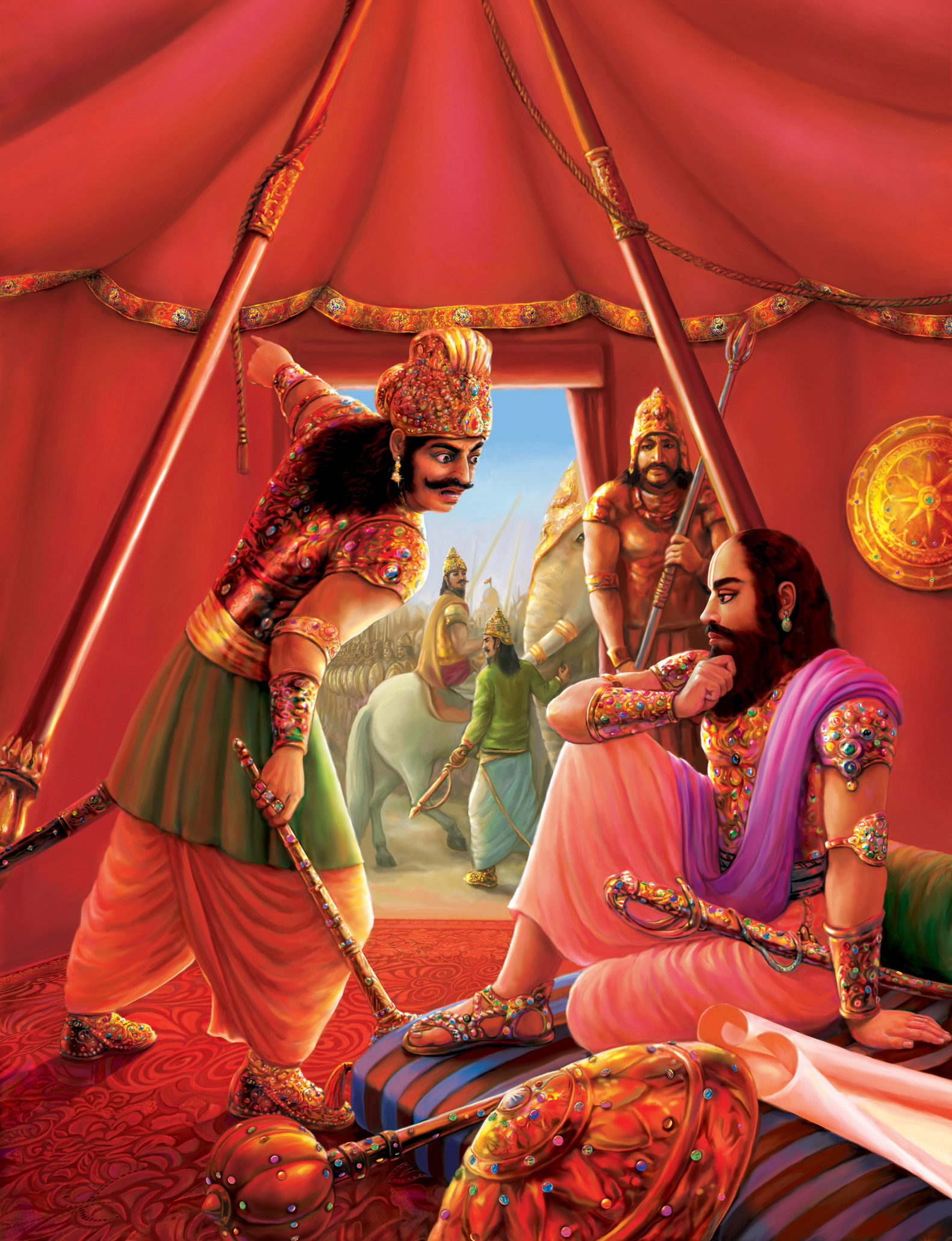
पश्यैतां पाण्डुपुत्राणामाचार्य महतीं चमूम्
व्यूढां द्रुपदपुत्रेण तव शिष्येण धीमता
paśyaitāṃ pāṇḍu-putrāṇām
ācārya mahatīṃ camūm
vyūḍhāṃ drupada-putreṇa
tava śiṣyeṇa dhīmatā
SYNONYMS
TRANSLATION
O my teacher, behold the great army of the sons of Pāṇḍu, so expertly arranged by your intelligent disciple, the son of Drupada.
PURPORT
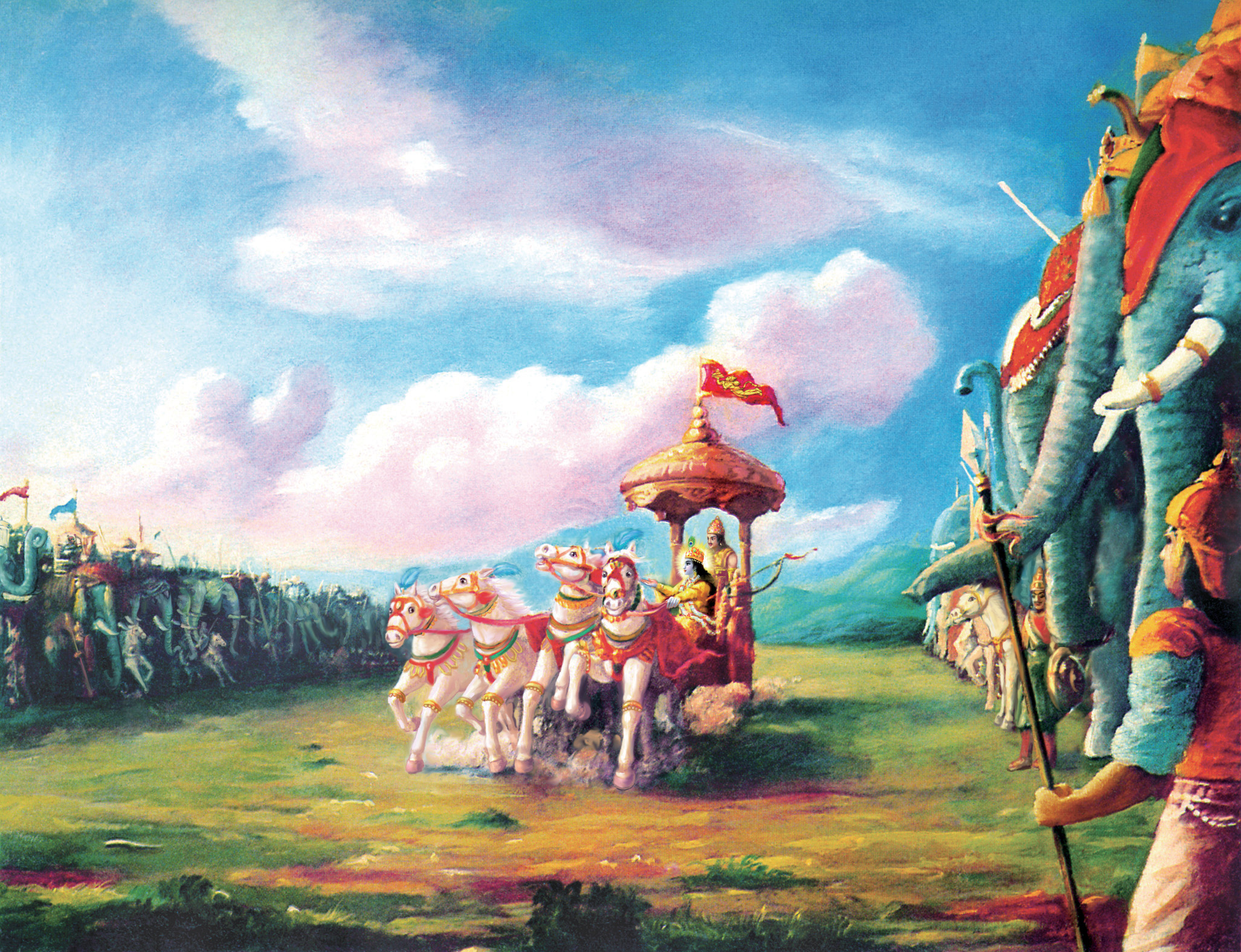
अत्र शूरा महेष्वासा भीमार्जुनसमा युधि
युयुधानो विराटश्च द्रुपदश्च महारथः
atra śūrā maheṣv-āsā
bhīmārjuna-samā yudhi
yuyudhāno virāṭaś ca
drupadaś ca mahā-rathaḥ
SYNONYMS
TRANSLATION
Here in this army there are many heroic bowmen equal in fighting to Bhīma and Arjuna; there are also great fighters like Yuyudhāna, Virāṭa and Drupada.
PURPORT
धृष्टकेतुश्चेकितानः काशिराजश्च वीर्यवान्
पुरुजित्कुन्तिभोजश्च शैब्यश्च नरपुङ्गवः
dhṛṣṭaketuś cekitānaḥ
kāśirājaś ca vīryavān
purujit kuntibhojaś ca
śaibyaś ca nara-puṅgavaḥ
SYNONYMS
TRANSLATION
There are also great, heroic, powerful fighters like Dhṛṣṭaketu, Cekitāna, Kāśirāja, Purujit, Kuntibhoja and Śaibya.
युधामन्युश्च विक्रान्त उत्तमौजाश्च वीर्यवान्
सौभद्रो द्रौपदेयाश्च सर्व एव महारथाः
yudhāmanyuś ca vikrānta
uttamaujāś ca vīryavān
saubhadro draupadeyāś ca
sarva eva mahā-rathāḥ
SYNONYMS
TRANSLATION
There are the mighty Yudhāmanyu, the very powerful Uttamaujā, the son of Subhadrā and the sons of Draupadī. All these warriors are great chariot fighters.
अस्माकं तु विशिष्टा ये तान्निबोध द्विजोत्तम
नायका मम सैन्यस्य संज्ञार्थं तान्ब्रवीमि ते
asmākaṃ tu viśiṣṭā ye
tān nibodha dvijottama
nāyakā mama sainyasya
saṃjñārthaṃ tān bravīmi te
SYNONYMS
TRANSLATION
O best of the brāhmaṇas, for your information, let me tell you about the captains who are especially qualified to lead my military force.
भवान्भीष्मश्च कर्णश्च कृपश्च समितिंजयः
अश्वत्थामा विकर्णश्च सौमदत्तिस्तथैव च
bhavān bhīṣmaś ca karṇaś ca
kṛpaś ca samitiṃ-jayaḥ
aśvatthāmā vikarṇaś ca
saumadattis tathaiva ca
SYNONYMS
TRANSLATION
There are personalities like yourself, Bhīṣma, Karṇa, Kṛpa, Aśvatthāmā, Vikarṇa and the son of Somadatta called Bhuriśravā, who are always victorious in battle.
PURPORT
अन्ये च बहवः शूरा मदर्थे त्यक्तजीविताः
नानाशस्त्रप्रहरणाः सर्वे युद्धविशारदाः
anye ca bahavaḥ śūrā
mad-arthe tyakta-jīvitāḥ
nānā-śastra-praharaṇāḥ
sarve yuddha-viśāradāḥ
SYNONYMS
TRANSLATION
There are many other heroes who are prepared to lay down their lives for my sake. All of them are well equipped with different kinds of weapons, and all are experienced in military science.
PURPORT
अपर्याप्तं तदस्माकं बलं भीष्माभिरक्षितम्
पर्याप्तं त्विदमेतेषां बलं भीमाभिरक्षितम्
aparyāptaṃ tad asmākaṃ
balaṃ bhīṣmābhirakṣitam
paryāptaṃ tv idam eteṣāṃ
balaṃ bhīmābhirakṣitam
SYNONYMS
TRANSLATION
Our strength is immeasurable, and we are perfectly protected by Grandfather Bhīṣma, whereas the strength of the Pāṇḍavas, carefully protected by Bhīma, is limited.
PURPORT
अयनेषु च सर्वेषु यथाभागमवस्थिताः
भीष्ममेवाभिरक्षन्तु भवन्तः सर्व एव हि
ayaneṣu ca sarveṣu
yathā-bhāgam avasthitāḥ
bhīṣmam evābhirakṣantu
bhavantaḥ sarva eva hi
SYNONYMS
TRANSLATION
Now all of you must give full support to Grandfather Bhīṣma, standing at your respective strategic points in the phalanx of the army.
PURPORT
तस्य सञ्जनयन्हर्षं कुरुवृद्धः पितामहः
सिंहनादं विनद्योच्चैः शङ्खं दध्मौ प्रतापवान्
tasya sañjanayan harṣaṃ
kuru-vṛddhaḥ pitāmahaḥ
siṃha-nādaṃ vinadyoccaiḥ
śaṅkhaṃ dadhmau pratāpavān
SYNONYMS
TRANSLATION
Then Bhīṣma, the great valiant grandsire of the Kuru dynasty, the grandfather of the fighters, blew his conchshell very loudly like the sound of a lion, giving Duryodhana joy.
PURPORT
ततः शङ्खाश्च भेर्यश्च पणवानकगोमुखाः
सहसैवाभ्यहन्यन्त स शब्दस्तुमुलोऽभवत्
tataḥ śaṅkhāś ca bheryaś ca
paṇavānaka-gomukhāḥ
sahasaivābhyahanyanta
sa śabdas tumulo ‘bhavat
SYNONYMS
TRANSLATION
After that, the conchshells, bugles, trumpets, drums and horns were all suddenly sounded, and the combined sound was tumultuous.
ततः श्वेतैर्हयैर्युक्ते महति स्यन्दने स्थितौ
माधवः पाण्डवश्चैव दिव्यौ शङ्खौ प्रदध्मतुः
tataḥ śvetair hayair yukte
mahati syandane sthitau
mādhavaḥ pāṇḍavaś caiva
divyau śaṅkhau pradadhmatuḥ
SYNONYMS
TRANSLATION
On the other side, both Lord Kṛṣṇa and Arjuna, stationed on a great chariot drawn by white horses, sounded their transcendental conchshells.
PURPORT
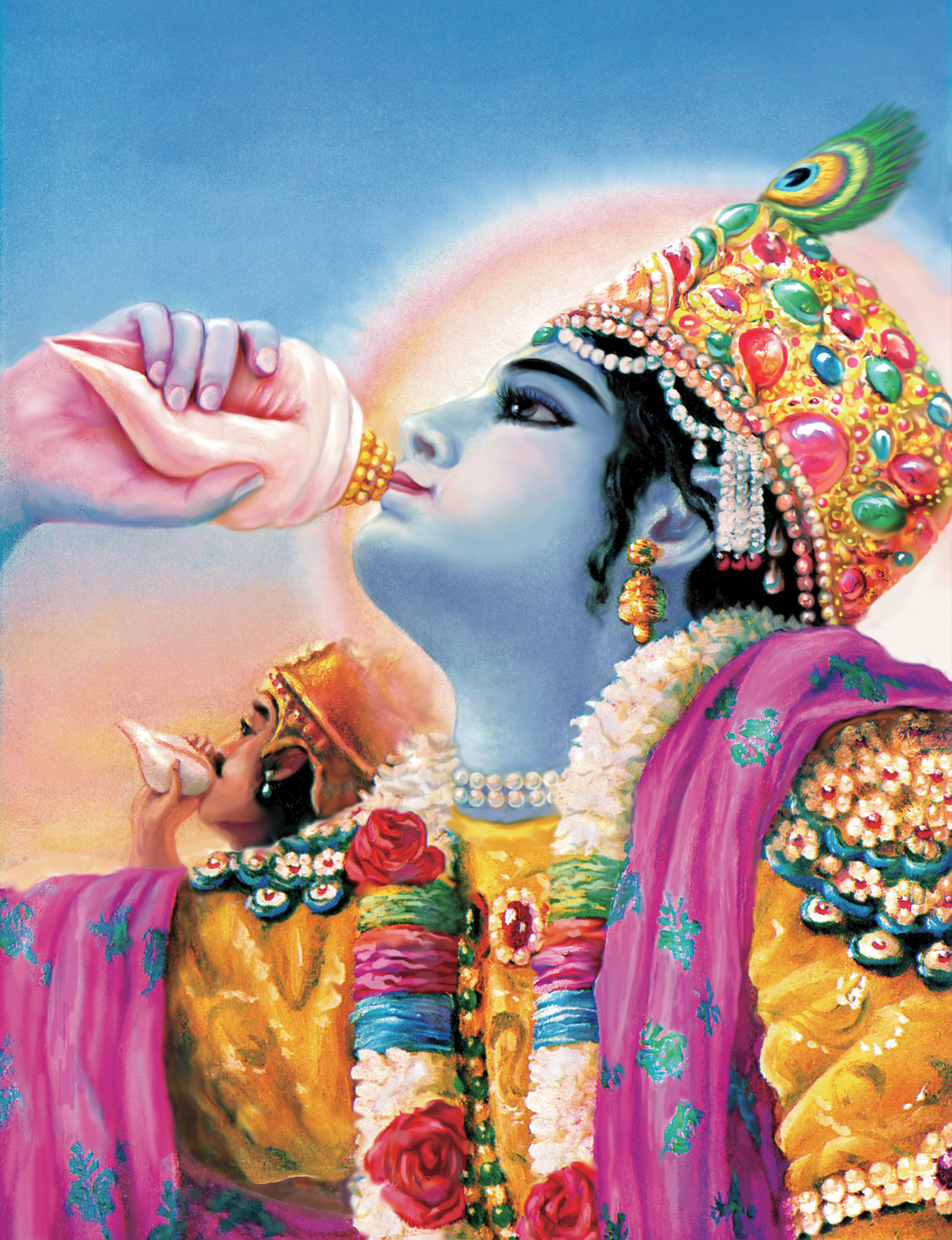
पाञ्चजन्यं हृषीकेशो देवदत्तं धनञ्जयः
पौण्ड्रं दध्मौ महाशङ्खं भीमकर्मा वृकोदरः
pāñcajanyaṃ hṛṣīkeśo
devadattaṃ dhanañjayaḥ
pauṇḍraṃ dadhmau mahā-śaṅkhaṃ
bhīma-karmā vṛkodaraḥ
SYNONYMS
TRANSLATION
Then, Lord Kṛṣṇa blew His conchshell, called Pāñcajanya; Arjuna blew his, the Devadatta; and Bhīma, the voracious eater and performer of Herculean tasks, blew his terrific conchshell called Pauṇḍram.
PURPORT
Arjuna is referred to as Dhanañjaya in this verse because he helped his elder brother in fetching wealth when it was required by the King to make expenditures for different sacrifices. Similarly, Bhīma is known as Vṛkodara because he could eat as voraciously as he could perform Herculean tasks, such as killing the demon Hiḍimba. So, the particular types of conchshell blown by the different personalities on the side of the Pāṇḍavas, beginning with the Lord’s, were all very encouraging to the fighting soldiers. On the other side there were no such credits, nor the presence of Lord Kṛṣṇa, the supreme director, nor that of the goddess of fortune. So, they were predestined to lose the battle-and that was the message announced by the sounds of the conchshells.
अनन्तविजयं राजा कुन्तीपुत्रो युधिष्ठिरः
नकुलः सहदेवश्च सुघोषमणिपुष्पकौ
काश्यश्च परमेष्वासः शिखण्डी च महारथः
धृष्टद्युम्नो विराटश्च सात्यकिश्चापराजितः
द्रुपदो द्रौपदेयाश्च सर्वशः पृथिवीपते
सौभद्रश्च महाबाहुः शङ्खान्दध्मुः पृथक्पृथक्
anantavijayaṃ rājā
kuntī-putro yudhiṣṭhiraḥ
nakulaḥ sahadevaś ca
sughoṣa-maṇipuṣpakau
kāśyaś ca parameṣv-āsaḥ
śikhaṇḍī ca mahā-rathaḥ
dhṛṣṭadyumno virāṭaś ca
sātyakiś cāparājitaḥ
drupado draupadeyāś ca
sarvaśaḥ pṛthivī-pate
saubhadraś ca mahā-bāhuḥ
śaṅkhān dadhmuḥ pṛthak pṛthak
SYNONYMS
TRANSLATION
King Yudhiṣṭhira, the son of Kuntī, blew his conchshell, the Anantavijaya, and Nakula and Sahadeva blew the Sughoṣa and Maṇipuṣpaka. That great archer the King of Kāśī, the great fighter Śikhaṇḍī, Dhṛṣṭadyumna, Virāṭa and the unconquerable Sātyaki, Drupada, the sons of Draupadī, and the others, O King, such as the son of Subhadrā, greatly armed, all blew their respective conchshells.
PURPORT
स घोषो धार्तराष्ट्राणां हृदयानि व्यदारयत्
नभश्च पृथिवीं चैव तुमुलोऽभ्यनुनादयन्
sa ghoṣo dhārtarāṣṭrāṇāṃ
hṛdayāni vyadārayat
nabhaś ca pṛthivīṃ caiva
tumulo ‘bhyanunādayan
SYNONYMS
TRANSLATION
The blowing of these different conchshells became uproarious, and thus, vibrating both in the sky and on the earth, it shattered the hearts of the sons of Dhṛtarāṣṭra.
PURPORT
अथ व्यवस्थितान्दृष्ट्वा धार्तराष्ट्रान्कपिध्वजः
प्रवृत्ते शस्त्रसम्पाते धनुरुद्यम्य पाण्डवः
हृषीकेशं तदा वाक्यमिदमाह महीपते
atha vyavasthitān dṛṣṭvā
dhārtarāṣṭrān kapi-dhvajaḥ
pravṛtte śastra-sampāte
dhanur udyamya pāṇḍavaḥ
hṛṣīkeśaṃ tadā vākyam
idam āha mahī-pate
SYNONYMS
TRANSLATION
O King, at that time Arjuna, the son of Pāṇḍu, who was seated in his chariot, his flag marked with Hanumān, took up his bow and prepared to shoot his arrows, looking at the sons of Dhṛtarāṣṭra. O King, Arjuna then spoke to Hṛṣīkeśa [Kṛṣṇa] these words:
PURPORT
अर्जुन उवाच
सेनयोरुभयोर्मध्ये रथं स्थापय मेऽच्युत
यावदेतान्निरीक्षेऽहं योद्धुकामानवस्थितान्
कैर्मया सह योद्धव्यमस्मिन्रणसमुद्यमे
arjuna uvāca
senayor ubhayor madhye
rathaṃ sthāpaya me ‘cyuta
yāvad etān nirīkṣe ‘haṃ
yoddhu-kāmān avasthitān
kair mayā saha yoddhavyam
asmin raṇa-samudyame
SYNONYMS
TRANSLATION
Arjuna said: O infallible one, please draw my chariot between the two armies so that I may see who is present here, who is desirous of fighting, and with whom I must contend in this great battle attempt.
PURPORT
As a pure devotee of the Lord, Arjuna had no desire to fight with his cousins and brothers, but he was forced to come onto the battlefield by the obstinacy of Duryodhana, who was never agreeable to any peaceful negotiation. Therefore, he was very anxious to see who the leading persons present on the battlefield were. Although there was no question of a peacemaking endeavor on the battlefield, he wanted to see them again, and to see how much they were bent upon demanding an unwanted war.
योत्स्यमानानवेक्षेऽहं य एतेऽत्र समागताः
धार्तराष्ट्रस्य दुर्बुद्धेर्युद्धे प्रियचिकीर्षवः
yotsyamānān avekṣe ‘haṃ
ya ete ‘tra samāgatāḥ
dhārtarāṣṭrasya durbuddher
yuddhe priya-cikīrṣavaḥ
SYNONYMS
TRANSLATION
Let me see those who have come here to fight, wishing to please the evil-minded son of Dhṛtarāṣṭra.
PURPORT
सञ्जय उवाच
एवमुक्तो हृषीकेशो गुडाकेशेन भारत
सेनयोरुभयोर्मध्ये स्थापयित्वा रथोत्तमम्
sañjaya uvāca
evam ukto hṛṣīkeśo
guḍākeśena bhārata
senayor ubhayor madhye
sthāpayitvā rathottamam
SYNONYMS
TRANSLATION
Sañjaya said: O descendant of Bharata, being thus addressed by Arjuna, Lord Kṛṣṇa drew up the fine chariot in the midst of the armies of both parties.
PURPORT
भीष्मद्रोणप्रमुखतः सर्वेषां च महीक्षिताम्
उवाच पार्थ पश्यैतान्
समवेतान्कुरूनिति
bhīṣma-droṇa-pramukhataḥ
sarveṣāṃ ca mahī-kṣitām
uvāca pārtha paśyaitān
samavetān kurūn iti
SYNONYMS
TRANSLATION
In the presence of Bhīṣma, Droṇa and all other chieftains of the world, Hṛṣīkeśa, the Lord, said, Just behold, Pārtha, all the Kurus who are assembled here.
PURPORT
तत्रापश्यत्स्थितान्पार्थः पितॄनथ पितामहान्
आचार्यान्मातुलान्भ्रातॄन्पुत्रान्पौत्रान्सखींस्तथा
श्वशुरान्सुहृदश्चैव सेनयोरुभयोरपि
tatrāpaśyat sthitān pārthaḥ
pitṝn atha pitāmahān
ācāryān mātulān bhrātṝn
putrān pautrān sakhīṃs tathā
śvaśurān suhṛdaś caiva
senayor ubhayor api
SYNONYMS
TRANSLATION
There Arjuna could see, within the midst of the armies of both parties, his fathers, grandfathers, teachers, maternal uncles, brothers, sons, grandsons, friends, and also his father-in-law and well-wishers-all present there.
PURPORT
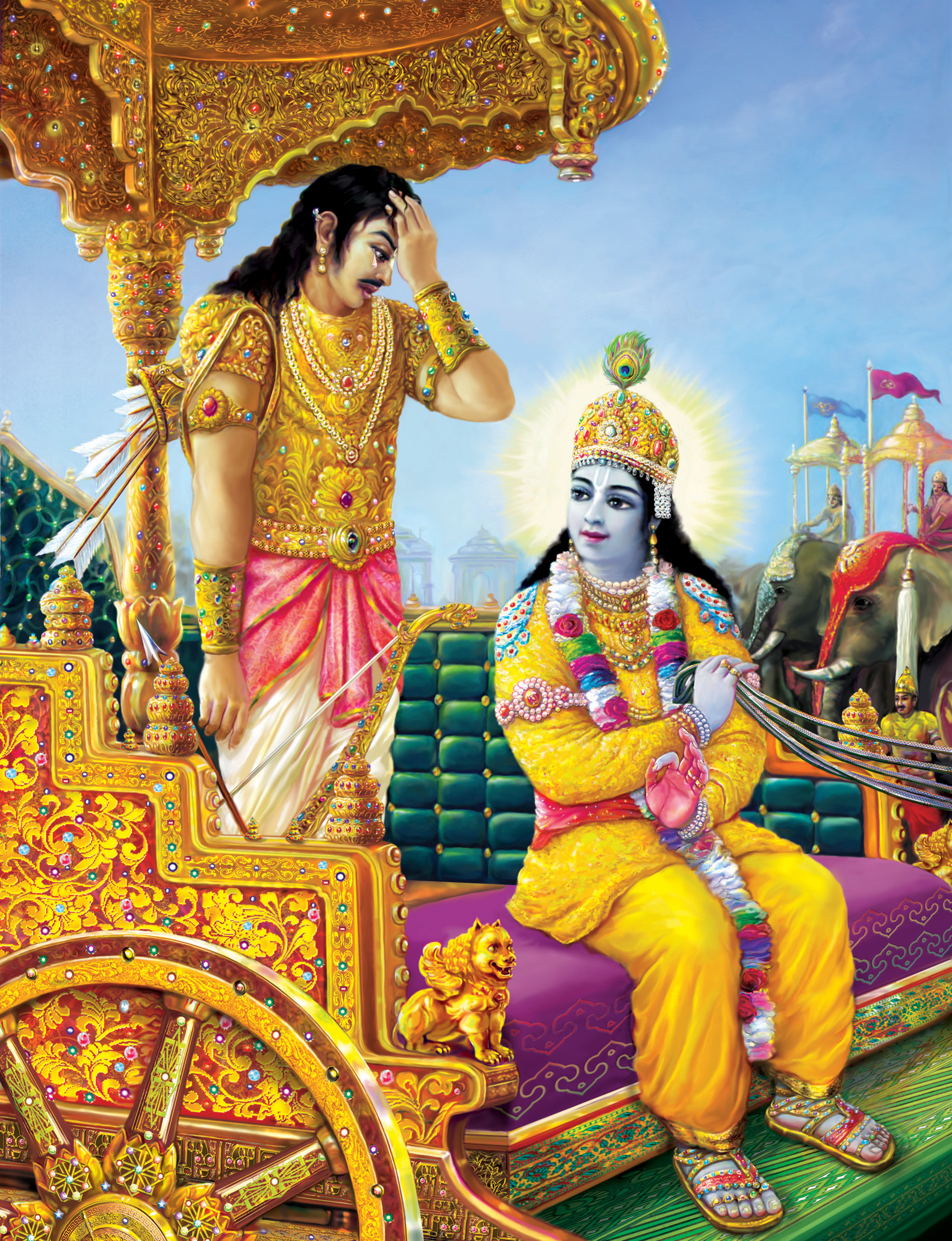
तान्समीक्ष्य स कौन्तेयः सर्वान्बन्धूनवस्थितान्
कृपया परयाविष्टो विषीदन्निदमब्रवीत्
tān samīkṣya sa kaunteyaḥ
sarvān bandhūn avasthitān
kṛpayā parayāviṣṭo
viṣīdann idam abravīt
SYNONYMS
TRANSLATION
When the son of Kuntī, Arjuna, saw all these different grades of friends and relatives, he became overwhelmed with compassion and spoke thus:
अर्जुन उवाच
दृष्ट्वेमं स्वजनं कृष्ण युयुत्सुं समुपस्थितम्
सीदन्ति मम गात्राणि मुखं च परिशुष्यति
arjuna uvāca
dṛṣṭvemaṃ sva-janaṃ kṛṣṇa
yuyutsuṃ samupasthitam
sīdanti mama gātrāṇi
mukhaṃ ca pariśuṣyati
SYNONYMS
TRANSLATION
Arjuna said: My dear Kṛṣṇa, seeing my friends and relatives present before me in such a fighting spirit, I feel the limbs of my body quivering and my mouth drying up.
PURPORT
yasyāsti bhaktir bhagavaty akiñcanā
sarvair guṇais tatra samāsate surāḥ
harāv abhaktasya kuto mahad-guṇā
mano-rathenāsati dhāvato bahiḥ
“One who has unflinching devotion for the Personality of Godhead has all the good qualities of the demigods. But one who is not a devotee of the Lord has only material qualifications that are of little value. This is because he is hovering on the mental plane and is certain to be attracted by the glaring material energy.” (Bhāg. 5.18.12)
वेपथुश्च शरीरे मे रोमहर्षश्च जायते
गाण्डीवं स्रंसते हस्तात्त्वक्चैव परिदह्यते
vepathuś ca śarīre me
roma-harṣaś ca jāyate
gāṇḍīvaṃ sraṃsate hastāt
tvak caiva paridahyate
SYNONYMS
TRANSLATION
My whole body is trembling, and my hair is standing on end. My bow Gāṇḍīva is slipping from my hand, and my skin is burning.
PURPORT
न च शक्नोम्यवस्थातुं भ्रमतीव च मे मनः
निमित्तानि च पश्यामि विपरीतानि केशव
na ca śaknomy avasthātuṃ
bhramatīva ca me manaḥ
nimittāni ca paśyāmi
viparītāni keśava
SYNONYMS
TRANSLATION
I am now unable to stand here any longer. I am forgetting myself, and my mind is reeling. I foresee only evil, O killer of the Keśī demon.
PURPORT
न च श्रेयोऽनुपश्यामि हत्वा स्वजनमाहवे
न काङ्क्षे विजयं कृष्ण न च राज्यं सुखानि च
na ca śreyo ‘nupaśyāmi
hatvā sva-janam āhave
na kāṅkṣe vijayaṃ kṛṣṇa
na ca rājyaṃ sukhāni ca
SYNONYMS
TRANSLATION
I do not see how any good can come from killing my own kinsmen in this battle, nor can I, my dear Kṛṣṇa, desire any subsequent victory, kingdom, or happiness.
PURPORT
किं नो राज्येन गोविन्द किं भोगैर्जीवितेन वा
येषामर्थे काङ्क्षितं नो राज्यं भोगाः सुखानि च
त इमेऽवस्थिता युद्धे प्राणांस्त्यक्त्वा धनानि च
आचार्याः पितरः पुत्रास्तथैव च पितामहाः
मातुलाः श्वशुराः पौत्राः श्यालाः सम्बन्धिनस्तथा
एतान्न हन्तुमिच्छामि घ्नतोऽपि मधुसूदन
अपि त्रैलोक्यराज्यस्य हेतोः किं नु महीकृते
निहत्य धार्तराष्ट्रान्नः का प्रीतिः स्याज्जनार्दन
kiṃ no rājyena govinda
kiṃ bhogair jīvitena vā
yeṣām arthe kāṅkṣitaṃ no
rājyaṃ bhogāḥ sukhāni ca
ta ime ‘vasthitā yuddhe
prāṇāṃs tyaktvā dhanāni ca
ācāryāḥ pitaraḥ putrās
tathaiva ca pitāmahāḥ
mātulāḥ śvaśurāḥ pautrāḥ
śyālāḥ sambandhinas tathā
etān na hantum icchāmi
ghnato ‘pi madhusūdana
api trailokya-rājyasya
hetoḥ kiṃ nu mahī-kṛte
nihatya dhārtarāṣṭrān naḥ
kā prītiḥ syāj janārdana
SYNONYMS
TRANSLATION
O Govinda, of what avail to us are kingdoms, happiness or even life itself when all those for whom we may desire them are now arrayed in this battlefield? O Madhusūdana, when teachers, fathers, sons, grandfathers, maternal uncles, fathers-in-law, grandsons, brothers-in-law and all relatives are ready to give up their lives and properties and are standing before me, then why should I wish to kill them, though I may survive? O maintainer of all creatures, I am not prepared to fight with them even in exchange for the three worlds, let alone this earth.
PURPORT
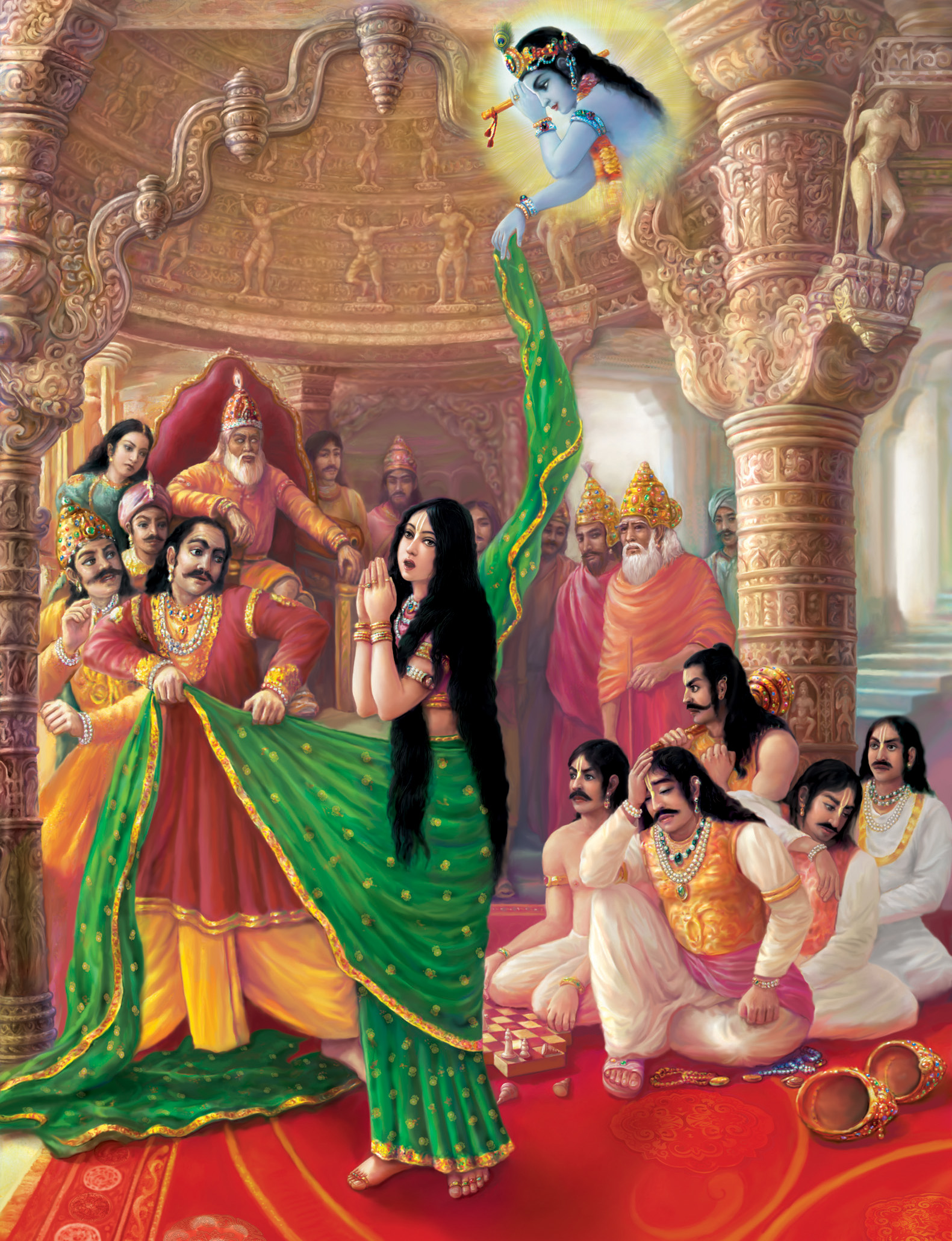
पापमेवाश्रयेदस्मान्हत्वैतानाततायिनः
तस्मान्नार्हा वयं हन्तुं धार्तराष्ट्रान्सबान्धवान्
स्वजनं हि कथं हत्वा सुखिनः स्याम माधव
pāpam evāśrayed asmān
hatvaitān ātatāyinaḥ
tasmān nārhā vayaṃ hantuṃ
dhārtarāṣṭrān sa-bāndhavān
sva-janaṃ hi kathaṃ hatvā
sukhinaḥ syāma mādhava
SYNONYMS
TRANSLATION
Sin will overcome us if we slay such aggressors. Therefore it is not proper for us to kill the sons of Dhṛtarāṣṭra and our friends. What should we gain, O Kṛṣṇa, husband of the goddess of fortune, and how could we be happy by killing our own kinsmen?
PURPORT
यद्यप्येते न पश्यन्ति लोभोपहतचेतसः
कुलक्षयकृतं दोषं मित्रद्रोहे च पातकम्
कथं न ज्ञेयमस्माभिः पापादस्मान्निवर्तितुम्
कुलक्षयकृतं दोषं प्रपश्यद्भिर्जनार्दन
yady apy ete na paśyanti
lobhopahata-cetasaḥ
kula-kṣaya-kṛtaṃ doṣaṃ
mitra-drohe ca pātakam
kathaṃ na jñeyam asmābhiḥ
pāpād asmān nivartitum
kula-kṣaya-kṛtaṃ doṣaṃ
prapaśyadbhir janārdana
SYNONYMS
TRANSLATION
O Janārdana, although these men, overtaken by greed, see no fault in killing one’s family or quarreling with friends, why should we, with knowledge of the sin, engage in these acts?
PURPORT
कुलक्षये प्रणश्यन्ति कुलधर्माः सनातनाः
धर्मे नष्टे कुलं कृत्स्नमधर्मोऽभिभवत्युत
kula-kṣaye praṇaśyanti
kula-dharmāḥ sanātanāḥ
dharme naṣṭe kulaṃ kṛtsnam
adharmo ‘bhibhavaty uta
SYNONYMS
TRANSLATION
With the destruction of dynasty, the eternal family tradition is vanquished, and thus the rest of the family becomes involved in irreligious practice.
PURPORT
अधर्माभिभवात्कृष्ण प्रदुष्यन्ति कुलस्त्रियः
स्त्रीषु दुष्टासु वार्ष्णेय जायते वर्णसङ्करः
adharmābhibhavāt kṛṣṇa
praduṣyanti kula-striyaḥ
strīṣu duṣṭāsu vārṣṇeya
jāyate varṇa-saṅkaraḥ
SYNONYMS
TRANSLATION
When irreligion is prominent in the family, O Kṛṣṇa, the women of the family become corrupt, and from the degradation of womanhood, O descendant of Vṛṣṇi, comes unwanted progeny.
PURPORT
सङ्करो नरकायैव कुलघ्नानां कुलस्य च
पतन्ति पितरो ह्येषां लुप्तपिण्डोदकक्रियाः
saṅkaro narakāyaiva
kula-ghnānāṃ kulasya ca
patanti pitaro hy eṣāṃ
lupta-piṇḍodaka-kriyāḥ
SYNONYMS
TRANSLATION
When there is increase of unwanted population, a hellish situation is created both for the family and for those who destroy the family tradition. In such corrupt families, there is no offering of oblations of food and water to the ancestors.
PURPORT
devarṣi-bhūtāpta-nṛnāṃ pitṝṇāṃ
na kiṅkaro nāyamṛṇī ca rājan
sarvātmanā yaḥ śaraṇaṃ śaraṇyaṃ
gato mukundaṃ parihṛtya kartam
“Anyone who has taken shelter of the lotus feet of Mukunda, the giver of liberation, giving up all kinds of obligation, and has taken to the path in all seriousness, owes neither duties nor obligations to the demigods, sages, general living entities, family members, humankind or forefathers.” (Bhāg. 11.5.41) Such obligations are automatically fulfilled by performance of devotional service to the Supreme Personality of Godhead.
दोषैरेतैः कुलघ्नानां वर्णसङ्करकारकैः
उत्साद्यन्ते जातिधर्माः कुलधर्माश्च शाश्वताः
doṣair etaiḥ kula-ghnānāṃ
varṇa-saṅkara-kārakaiḥ
utsādyante jāti-dharmāḥ
kula-dharmāś ca śāśvatāḥ
SYNONYMS
TRANSLATION
Due to the evil deeds of the destroyers of family tradition, all kinds of community projects and family welfare activities are devastated.
PURPORT
उत्सन्नकुलधर्माणां मनुष्याणां जनार्दन
नरके नियतं वासो भवतीत्यनुशुश्रुम
utsanna-kula-dharmāṇāṃ
manuṣyāṇāṃ janārdana
narake niyataṃ vāso
bhavatīty anuśuśruma
SYNONYMS
TRANSLATION
O Kṛṣṇa, maintainer of the people, I have heard by disciplic succession that those who destroy family traditions dwell always in hell.
PURPORT
अहो बत महत्पापं कर्तुं व्यवसिता वयम्
यद्राज्यसुखलोभेन हन्तुं स्वजनमुद्यताः
aho bata mahat pāpaṃ
kartuṃ vyavasitā vayam
yad rājya-sukha-lobhena
hantuṃ sva-janam udyatāḥ
SYNONYMS
TRANSLATION
Alas, how strange it is that we are preparing to commit greatly sinful acts, driven by the desire to enjoy royal happiness.
PURPORT
यदि मामप्रतीकारमशस्त्रं शस्त्रपाणयः
धार्तराष्ट्रा रणे हन्युस्तन्मे क्षेमतरं भवेत्
yadi mām apratīkāram
aśastraṃ śastra-pāṇayaḥ
dhārtarāṣṭrā raṇe hanyus
tan me kṣemataraṃ bhavet
SYNONYMS
TRANSLATION
I would consider it better for the sons of Dhṛtarāṣṭra to kill me unarmed and unresisting, rather than fight with them.
PURPORT
सञ्जय उवाच
एवमुक्त्वार्जुनः सङ्ख्ये रथोपस्थ उपाविशत्
विसृज्य सशरं चापं शोकसंविग्नमानसः
sañjaya uvāca
evam uktvārjunaḥ saṅkhye
rathopastha upāviśat
visṛjya sa-śaraṃ cāpaṃ
śoka-saṃvigna-mānasaḥ
SYNONYMS
TRANSLATION
Sañjaya said: Arjuna, having thus spoken on the battlefield, cast aside his bow and arrows and sat down on the chariot, his mind overwhelmed with grief.
PURPORT
Thus end the Bhaktivedanta Purports to the First Chapter of the Śrīmad-Bhagavad-gītā in the matter of Observing the Armies on the Battlefield of Kurukṣetra.